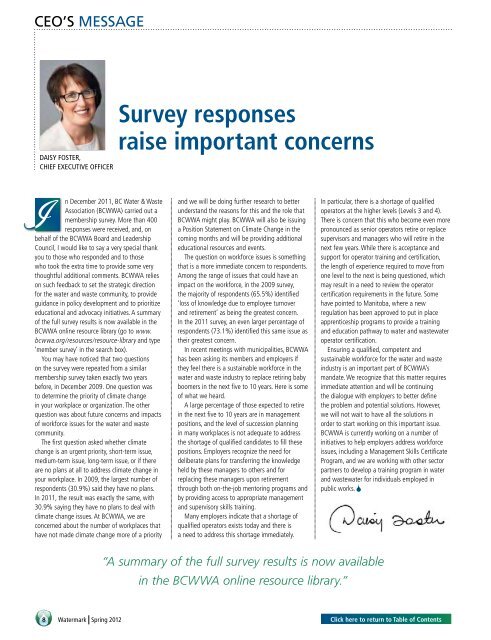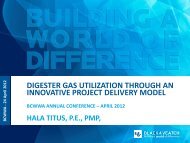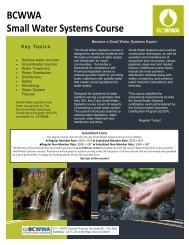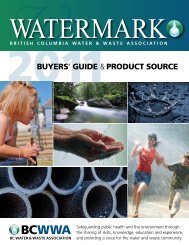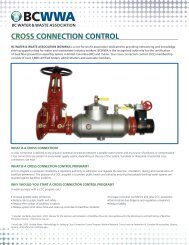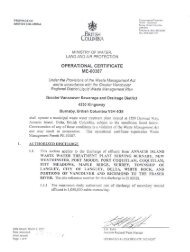Download - BC Water & Waste Association
Download - BC Water & Waste Association
Download - BC Water & Waste Association
You also want an ePaper? Increase the reach of your titles
YUMPU automatically turns print PDFs into web optimized ePapers that Google loves.
CEO’S MESSAGE<br />
DAISy FOSTER,<br />
CHIEF ExECuTIVE OFFICER<br />
I<br />
n December 2011, <strong>BC</strong> <strong>Water</strong> & <strong>Waste</strong><br />
<strong>Association</strong> (<strong>BC</strong>WWA) carried out a<br />
membership survey. More than 400<br />
responses were received, and, on<br />
behalf of the <strong>BC</strong>WWA Board and Leadership<br />
Council, I would like to say a very special thank<br />
you to those who responded and to those<br />
who took the extra time to provide some very<br />
thoughtful additional comments. <strong>BC</strong>WWA relies<br />
on such feedback to set the strategic direction<br />
for the water and waste community, to provide<br />
guidance in policy development and to prioritize<br />
educational and advocacy initiatives. A summary<br />
of the full survey results is now available in the<br />
<strong>BC</strong>WWA online resource library (go to www.<br />
bcwwa.org/resources/resource-library and type<br />
‘member survey’ in the search box).<br />
You may have noticed that two questions<br />
on the survey were repeated from a similar<br />
membership survey taken exactly two years<br />
before, in December 2009. One question was<br />
to determine the priority of climate change<br />
in your workplace or organization. The other<br />
question was about future concerns and impacts<br />
of workforce issues for the water and waste<br />
community.<br />
The first question asked whether climate<br />
change is an urgent priority, short-term issue,<br />
medium-term issue, long-term issue, or if there<br />
are no plans at all to address climate change in<br />
your workplace. In 2009, the largest number of<br />
respondents (30.9%) said they have no plans.<br />
In 2011, the result was exactly the same, with<br />
30.9% saying they have no plans to deal with<br />
climate change issues. At <strong>BC</strong>WWA, we are<br />
concerned about the number of workplaces that<br />
have not made climate change more of a priority<br />
8<br />
<strong>Water</strong>mark Spring 2012<br />
survey responses<br />
raise important concerns<br />
and we will be doing further research to better<br />
understand the reasons for this and the role that<br />
<strong>BC</strong>WWA might play. <strong>BC</strong>WWA will also be issuing<br />
a Position Statement on Climate Change in the<br />
coming months and will be providing additional<br />
educational resources and events.<br />
The question on workforce issues is something<br />
that is a more immediate concern to respondents.<br />
Among the range of issues that could have an<br />
impact on the workforce, in the 2009 survey,<br />
the majority of respondents (65.5%) identified<br />
‘loss of knowledge due to employee turnover<br />
and retirement’ as being the greatest concern.<br />
In the 2011 survey, an even larger percentage of<br />
respondents (73.1%) identified this same issue as<br />
their greatest concern.<br />
In recent meetings with municipalities, <strong>BC</strong>WWA<br />
has been asking its members and employers if<br />
they feel there is a sustainable workforce in the<br />
water and waste industry to replace retiring baby<br />
boomers in the next five to 10 years. Here is some<br />
of what we heard.<br />
A large percentage of those expected to retire<br />
in the next five to 10 years are in management<br />
positions, and the level of succession planning<br />
in many workplaces is not adequate to address<br />
the shortage of qualified candidates to fill these<br />
positions. Employers recognize the need for<br />
deliberate plans for transferring the knowledge<br />
held by these managers to others and for<br />
replacing these managers upon retirement<br />
through both on-the-job mentoring programs and<br />
by providing access to appropriate management<br />
and supervisory skills training.<br />
Many employers indicate that a shortage of<br />
qualified operators exists today and there is<br />
a need to address this shortage immediately.<br />
In particular, there is a shortage of qualified<br />
operators at the higher levels (Levels 3 and 4).<br />
There is concern that this who become even more<br />
pronounced as senior operators retire or replace<br />
supervisors and managers who will retire in the<br />
next few years. While there is acceptance and<br />
support for operator training and certification,<br />
the length of experience required to move from<br />
one level to the next is being questioned, which<br />
may result in a need to review the operator<br />
certification requirements in the future. Some<br />
have pointed to Manitoba, where a new<br />
regulation has been approved to put in place<br />
apprenticeship programs to provide a training<br />
and education pathway to water and wastewater<br />
operator certification.<br />
Ensuring a qualified, competent and<br />
sustainable workforce for the water and waste<br />
industry is an important part of <strong>BC</strong>WWA’s<br />
mandate. We recognize that this matter requires<br />
immediate attention and will be continuing<br />
the dialogue with employers to better define<br />
the problem and potential solutions. However,<br />
we will not wait to have all the solutions in<br />
order to start working on this important issue.<br />
<strong>BC</strong>WWA is currently working on a number of<br />
initiatives to help employers address workforce<br />
issues, including a Management Skills Certificate<br />
Program, and we are working with other sector<br />
partners to develop a training program in water<br />
and wastewater for individuals employed in<br />
public works.<br />
“A summary of the full survey results is now available<br />
in the <strong>BC</strong>WWA online resource library.”<br />
click here to return to table of contents


